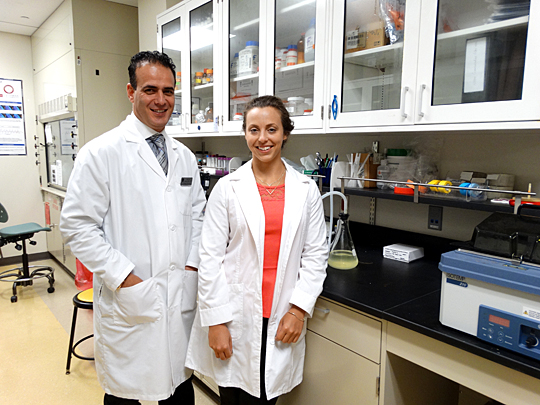Researchers at The University of Toledo are examining how a genetic kidney disorder also increases the person’s risk of cardiovascular disease and stroke.
Dr. Wissam AbouAlaiwi, assistant professor in the Department of Pharmacology and Experimental Therapeutics, received a three-year, $231,000 Scientist Development Grant, and doctoral student Hannah Saternos received a $2,000 award from the American Heart Association to study the pathophysiology of cardiovascular disease in polycystic kidney disease (PKD).

Dr. Wissam AbouAlaiwi and doctoral student Hannah Saternos both received grants for their research examining how a genetic kidney disorder increases a person’s risk of cardiovascular disease and stroke.
“There is currently no cure or treatment for PKD. A kidney transplant can buy an individual more time, but patients with PKD will still usually die from cardiovascular complications such as high blood pressure and heart disease,” AbouAlaiwi said.
AbouAlaiwi and his team are studying a cellular organelle called primary cilia and its role in kidney and cardiovascular disease.
“Primary cilia are antenna-like structures that, until recently, were believed to have no function in the body. We now know they contribute to dozens of genetic disorders and play a role in calcium signaling in heart cells, which is important to its contraction,” he said. “We have developed mouse models to further study these cilia and the complications that arise from their dysfunction.”
This is the third grant for AbouAlaiwi’s lab in one year, and he is quick to credit his team of students for their hard work and dedication.
“The students are very reliable and passionate and the driving force behind the research,” he said. “Funding for research is very competitive, and I am proud that Hannah was able to receive support from the American Heart Association. She is very talented, smart and dedicated to her work. The award is well-deserved.”
Saternos is researching the function of a family of receptors that she recently discovered in the primary cilia and how it affects PKD and regulates blood pressure.
“If you would have told me four years ago I would be working with the kidney and loving it, I would have thought you were crazy,” she said. “It’s fascinating. I don’t think people realize how much impact the kidney has on the rest of the body.”